|
|
|
Sort Order |
|
|
|
Items / Page
|
|
|
|
|
|
|
| Srl | Item |
| 1 |
ID:
127812


|
|
|
|
|
| Publication |
2014.
|
| Summary/Abstract |
From a theory on occupying regimes and from traditional concepts of counterinsurgency theory, the author traces back the development of the Dutch discourse regarding present day missions. The genesis of the so-called Dutch approach is studied, and the case of Uruzgan is reviewed by scrutinizing political, security, economic, and governance aspects of the use of the military in the aforementioned province of Afghanistan. The case is studied to determine whether there really is something Dutch about this approach. We learn that the "Dutch approach" is predominantly a narrative whose main objective is the appeasement of Dutch public opinion and the legitimation of Dutch policy making. At the same time and even though more comparative case studies are necessary, it seems plausible that the Dutch approach is different. But the difference is not typical Dutch; it lies in the manner of collaborating with and co-opting indigenous elites. Studying the genesis of the "Dutch approach" is therefore an analysis of a discourse and a study in operational effectiveness at the same time.
|
|
|
|
|
|
|
|
|
|
|
|
|
|
|
|
| 2 |
ID:
119502


|
|
|
|
|
| Publication |
2013.
|
| Summary/Abstract |
In Chechnya a protracted conflict only seemingly quieted down, but it still smolders and as the conflict is suppressed by coercion, it is inevitable that it will flare up at some time in the near future. The root causes of the conflict can be understood by use of globalization theory, which dialectically brings together the clashing forces from above and below. Civil society in Chechnya deteriorated, is politically curtailed, and has no resilience left. It thus results in a frozen conflict and an excluded and victimized society. Russian-style reconstruction does alleviate living conditions, but does not remediate the frozen conflict character of the present situation. The dynamics of the globalizing forces from below and above, summarized in the glocalization concept, not only explains the resistance by the Chechen people, for whom revolt, rebellion, and terrorism remain attractive options, but also serves as a model for other insurgencies. Reflecting on the two recent Chechen-Russian wars results in a paradigmatic case study.
|
|
|
|
|
|
|
|
|
|
|
|
|
|
|
|
| 3 |
ID:
106436


|
|
|
|
|
| Publication |
2011.
|
| Summary/Abstract |
As a consequence of various causes, numerous children are confronted with parental separation. By following families in the course of military deployments, this study aimed at enhancing knowledge on temporary father-child separation. Data were part of a longitudinal study of military families and were collected among Dutch service members and their partners before, during, and after a deployment to Bosnia or Afghanistan. Results revealed that the great majority of the children adapted quite well to the separation and reunion. Furthermore, the general well-being of the children, the mothers, and the fathers in the mission area was positively related. Unlike separation characteristics, maternal well-being was predictive of children's adjustment in the course of paternal deployment. Hence, the findings underline the importance of helping spouses cope with the absences of service members as it increases the chances that children will also be doing well in the course of parental absence.
|
|
|
|
|
|
|
|
|
|
|
|
|
|
|
|
|
|
|
|
|